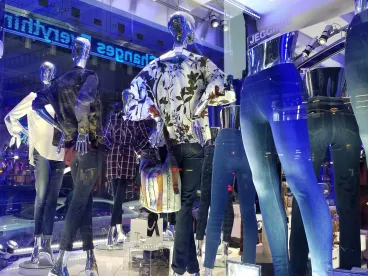Going into 2022, there are a couple of important developments every copyright owner should know. One is based on a brand new Supreme Court decision, and the other is the upcoming implementation of the Copyright Alternative in Small-Claims Enforcement Act (CASE Act). These developments aim to make enforcement actions against copyright infringers more accessible and effective. As a result, these new advances give fashion designers additional legal tools they can use in their arsenal of intellectual property protection. Key takeaways from Unicolors v. H&M, and the upcoming CASE Act, are highlighted below.
U.S. Supreme Court Rules That Faulty Copyright Registrations Based on Mistakes of Law Do Not Invalidate Registrations or Prevent Enforcement Actions.
On Thursday, February 24, 2022, the U.S. Supreme Court weighed in on the long-running copyright infringement dispute between Los Angeles fabric designer, Unicolors Inc., and global fast fashion giant, H&M Hennes & Mauritz L.P.
Unicolors’s lawsuit against H&M began in 2016 in the Central District of California. Unicolors alleged that H&M was incorporating one of its copyrighted fabric designs, a geometric pattern, without its authorization in connection with jackets and skirts. After a jury trial finding infringement, H&M was ordered to pay almost $800,000 in damages and attorneys’ fees and costs. Following that verdict, H&M appealed to the Ninth Circuit, who overturned the decision. The Ninth Circuit held that Unicolors’ copyright registration could possibly be void for failing to meet the “single unit of publication” requirement. The appellate court remanded to the district court, instructing it to refer to the Register of Copyright to determine whether such an inaccuracy would have caused registration to be refused. Before the action was remanded, Unicolors appealed to the U.S. Supreme Court.
In its 6-3 decision, the Supreme Court vacated the Ninth Circuit’s ruling and held that inadvertent inaccuracies in a copyright registration do not void such registration, nor do they preclude the copyright holder from bringing a valid infringement claim. Essential to the Supreme Court’s question was to determine the scope of the phrase “with knowledge that it was inaccurate,” as posited under Section 411(b)(1)(A), the safe harbor provision of the statute. Breaking from the Ninth Circuit, the Supreme Court found that Section 411(b) does not distinguish between mistake of law and mistake of fact – in other words, either mistake is justifiable grounds for excusing the inaccuracy of a copyright registration.
In reaching this decision, the Supreme Court cited extensive statutory references and case law which conform to the notion that forgiveness of copyright applicant’s legal mistakes were as much intended to be included as were factual mistakes. Perhaps most central to the Supreme Court’s position was the fact that, based on commentary records of Congressional reports, the intention of Congress in enacting Section 411(b) in the first place was to benefit the non-lawyer in making it copyright registration and enforcement easier, not harder. Thus, voiding a copyright registration due to mistakes of law, especially copyright law that is “often esoteric,” would undermine the intention of Congress.
The CASE Act’s Small Claims Copyright Court
In December 2020, Congress passed the Copyright Alternative in Small-Claims Enforcement Act of 2020 (the “CASE Act”) which established what is colloquially known as a small claims court for litigating infringement claims. As an alternative to bringing suit in federal court which is often prohibitive given the lengthy process and high legal costs, the CASE Act established the Copyright Claims Board (the “CCB”) as a speedier and more costeffective alternative to federal litigation for disputes with a monetary value of no more than $30,000. Through the CCB, litigants must mutually opt-in, meaning that if a defendant does not wish to participate in the CCB trial, the claim will not proceed. In this case, the plaintiff may still bring their case in federal court.
The CCB tribunal, which is set to begin operations as soon as Spring 2022, will cap statutory damages to $15,000 and actual damages to $30,000 (excluding attorneys’ fees and expenses, which in circumstances of bad faith are available up to a capped fee amount $5,000). It will also offer declaratory relief which may include declarations of infringement/non-infringement.
Unlike traditional copyright litigation in federal district court, CCB rulings will be decided by a three-judge tribunal (requiring consensus between two of the three judges). Additionally, the CCB decisions will not create new law or any form of precedent, and will only operate under the understandings of existing statutes and case law of the applicable federal jurisdiction.
Although the CCB is intended to lessen the burden of entry for claimants to bring copyright infringement suits, paving the way for a new outlet for minor disputes to be resolved, the mutual opt-in procedure will likely result in the CCB hearing cases between small parties. Given that larger defendants have a disproportionate amount of resources compared to small claimants, these defendants will likely refuse to participate in CCB matters, knowing that claimants will not have the resources to file federal suit. Therefore, we suspect that the CCB will primarily serve as an alternative dispute forum for relatively small companies. Nonetheless, it is new and viable option for designers to use to enforce their copyright interests.





 />i
/>i

